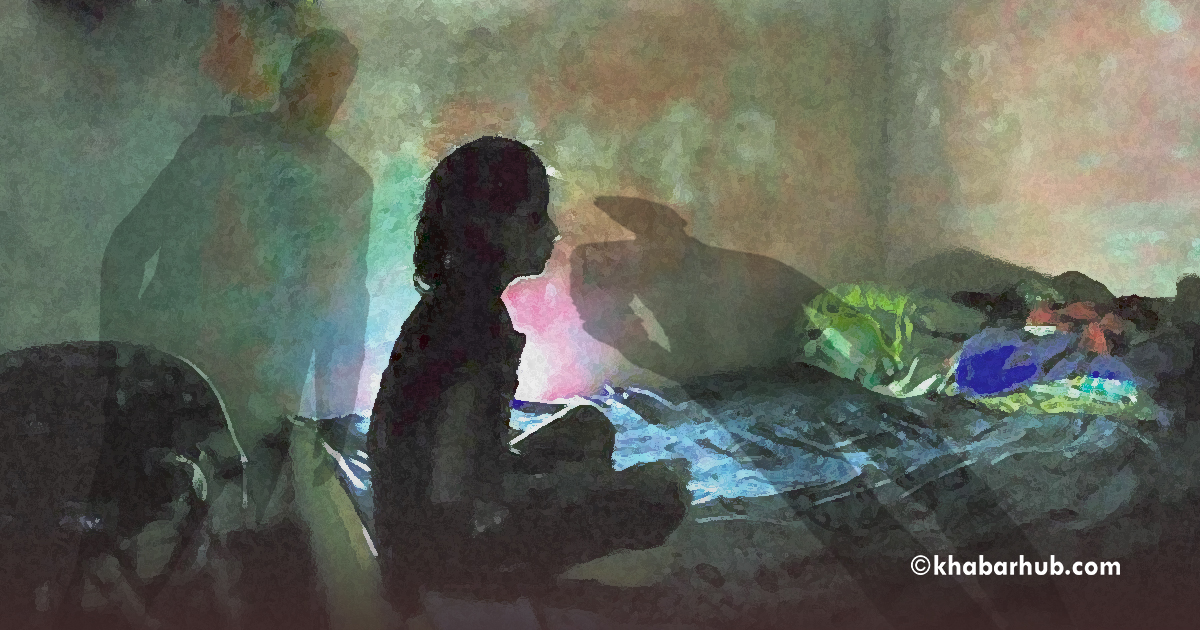KATHMANDU: Shocking to many Nepalis complaining about the declining norms and values and revealing the hollowness of the ‘modernization’ we are heading lately it is found that Nepali girls and women are trafficked to Nepal’s cities now.
DSP UmeshLamsal, the chief at the Metropolitan Police Circle Maharajgunj says that lately most of the major towns of Nepal are becoming the hub for girls trafficking.
The hotels, guesthouse, dance bar, massage center, the tiffin and snack house are found provoking and promoting the sex trades in such places making room for girls trafficking in the towns. After getting frequent complaints about the hotels and guest houses the police have initiated a ‘sweep operation’ in such places so as to curb the mushrooming sex trade.
In the ‘sweep operation’ launched on Jan14 alone, the police arrested 73 people involved in unlawful activities in Khajaghars and restaurants around New Buspark, Gongabu, Kathmandu.
DSP Lamsal informed that in the raid conducted to address the locals’ complaints about the unlawful and immoral activities going on in the area, the police have arrested 43 men, 25 women and 5 transgender people.
The primary investigation of the police reveals some got involved in the sex trade voluntarily whereas some more were either provoked, blackmailed or forced to adopt it as their profession.
Prior to this, Chitwan Police had made public 3 alleged of the incident related to taking hostage of a girl child and a teenager in a hotel. The alleged are said to have planned to traffic the victims for the sex trade.
Most of the victims are found cheated by their relatives and acquaintances. The criminals tempt them of lucrative jobs or easy money provided they go to those places.
The alleged in Chitwan incidents are a hotel owner and a trafficker. According to the police, they were found to have forced the teenager and the girl lost from Kathmandu to take to the sex trade.
Gongabu and Chitwan incidents are representative cases that reveal the nature and trend of sex trade reeling the major cities of the country.
“Human trafficking is not confined to a cross-border issue anymore, it’s growing chronic in the major towns inside the country as well.” SSP Ishwor Babu Karki, the Chief of Human Trafficking Investigation Bureau said to Khabarhub.
According to SSP Karki, most of the victims are the newcomers to the town and the women of poor economic background. Some ambitious girls aspiring to live a luxurious life also take to the trade. The trafficking agent arranged to take them to the hostels or restaurants making false promises satisfying the expectation of the prospective victims.
The Human Trafficking Report, 2019, made public by the National Human Rights Commission shows that more than 16000 girls and women working in the ‘entertainment and hospitality sector’ are at risk of trafficking.
According to Mohana Ansari, a Member at National Human Rights Commission said that the data included the trafficking as a whole.
“Although NHRC does not have the exact data of what number of girls and women were trafficked in the cities within the countries,” Ansari said, “lately the victims inside the country are also increasing massively.”
“Mainly the mushrooming massage center, dance bars, restaurants along with many areas of the entertainment sector are the areas where most of the girls and women working are at risk,” Ansari added.
More than 27000 victims of sexual exploitation in Kathmandu alone!
Study shows that there are more than 27000 girls and women victims of sexual exploitation in the Kathmandu valley alone.
According to the report ‘The Status of under- aged people in the entertainment sector of the adults in Kathmandu- 2019’ published by The Freedom Fund and New Era, 50000 people are working in more than 1200 places like hotels, restaurants, dance-bar, massage parlors of the valley.
According to the report 80%, or more than 40000 are girls and women and 68% or more than 27000 are the victims of sexual exploitation.
Aide Act International’s study conducted in 2013 had also mentioned that more than 25000 women and children working in hotels, guesthouses, restaurants, dance bar etc. felt the pressure for the sex trade.
It is high time that the regulatory mechanism should curb the trafficking, sexual exploitation and forced involvement in sex trade carried on in the name entertainment.
Kin act the abettor!
According to the sources, most of the people who reach the hotels, dance bars, massage centers and restaurants and are later exploited are taken to those places through their kins.
“The girls and women in search of the means for their livelihood fall prey.” says former DIG Keshav Adhikari, “ the relatives or friends who know the financial needs of the prospective victims take advantage of their helplessness and take them to such places.”
Studies also reveal that in some cases the victims, once they realize they can not come out from it, tempt their acquaintances to take to the profession as well. In other words, not all the people involved continue the sex trade as a compulsion, rather, they stick to it voluntarily esp when they realize they can not come out of it easily. Such people work as an agent to tempt more people to join the profession.
Besides, the professional sex workers are found giving continuation to the trade by renting a house or flat.
Curbing it needs cooperation and collaboration
The police complain about the lack of due cooperation from the victims of human trafficking.
When the issue is sensitive requiring lots of concrete proof to sue the alleged, the victims, as the tormentors and alleged are their acquaintances, don’t dare to sue them in the court.
The data at the Police Headquarter show that in 1005 cases of human trafficking recorded in 5 years 1176 have been arrested whereas 743 are absconding. This is the wholistic data.
The law deems thee sexual intercourse with the girls below 18 illegal, however, most of the workers in hotel, guesthouse, restaurants and massage centers are under 18 years and they turn victims of sexual exploitation.
Legal formalities constraints in curbing!
So far Nepal Police have been taking action against the criminals getting the girls and women involved Human Trafficking and Transportation (Control) Act 2007.
The law does not allow sexual intercourse with girls under 18. However, most of the workers in the hotel, guesthouse, restaurants, dance-bar and massage centers are below 18 years. Most of the victims of sexual exploitation belong to this age group as well.
Clause 66(3) of the Act Relating to Children, 2018 says: If any person does any of the following acts against a child, he or she shall be deemed to have committed child sexual abuse:
(a) To show, or cause to show, him or her an obscene picture, audio-visual recording or other material of similar kind or display, or cause to display, such expression or gesture that reflects obscene or sexual conduct or behavior to him or her or display, or cause to display child pornography,
(b) To distribute, store or use any actual or fictitious obscene picture or audio-visual material of him or her,
(c) To propose, lure, coerce or threaten him or her for sexual activity,
(d) To use him or her in the production of an obscene act and material,
(e) To touch, kiss, hold sensitive parts of body of him or her, embrace him or her with sexual intent or cause him or her to touch or hold sensitive parts of own body or body of another person or render him or her unconscious with sexual intent or display, or cause him or her to display sexual organs,
(f) To use, or cause to use, him or her for stimulating sexual lust or sexual excitement,
(g) To use, or cause to use, him or her for the purpose of sexual gratification,
(h) To engage, or cause to engage, in child sexual exploitation,
(i) To use, or cause to use, him or her with the intent of providing sexual services,
(j) To use, or cause to use, him or her with the intent of engaging in sexual abuse,
(k)To use him or her in prostitution or other sexual work.
Besides, Labour Act 2017, The Sexual Harassment at Workplace Prevention Act, 2015 also have strict provision against such abuse. However, the criminals manage to skip the law.
“Due to the lack of integrated law, it’s really not easy to curb such criminal activities.” said former DIG Hemanta Malla, “this lets the criminals take advantage of the loopholes.”
Former AIG Nava Raj Dhakal also thinks more strict measures are required to curb such crimes.“The regulatory authority should monitor and act strictly against the criminals involved in the child and women trafficking, sexual exploitation.” said former AIG Dhakal speaking to Khabarhub.
Besides strict regulations, arranging for the alternative means of livelihood to the vulnerable group, awareness programs and literacy are other ways that can help the society get rid of such heinous crimes.









Comment